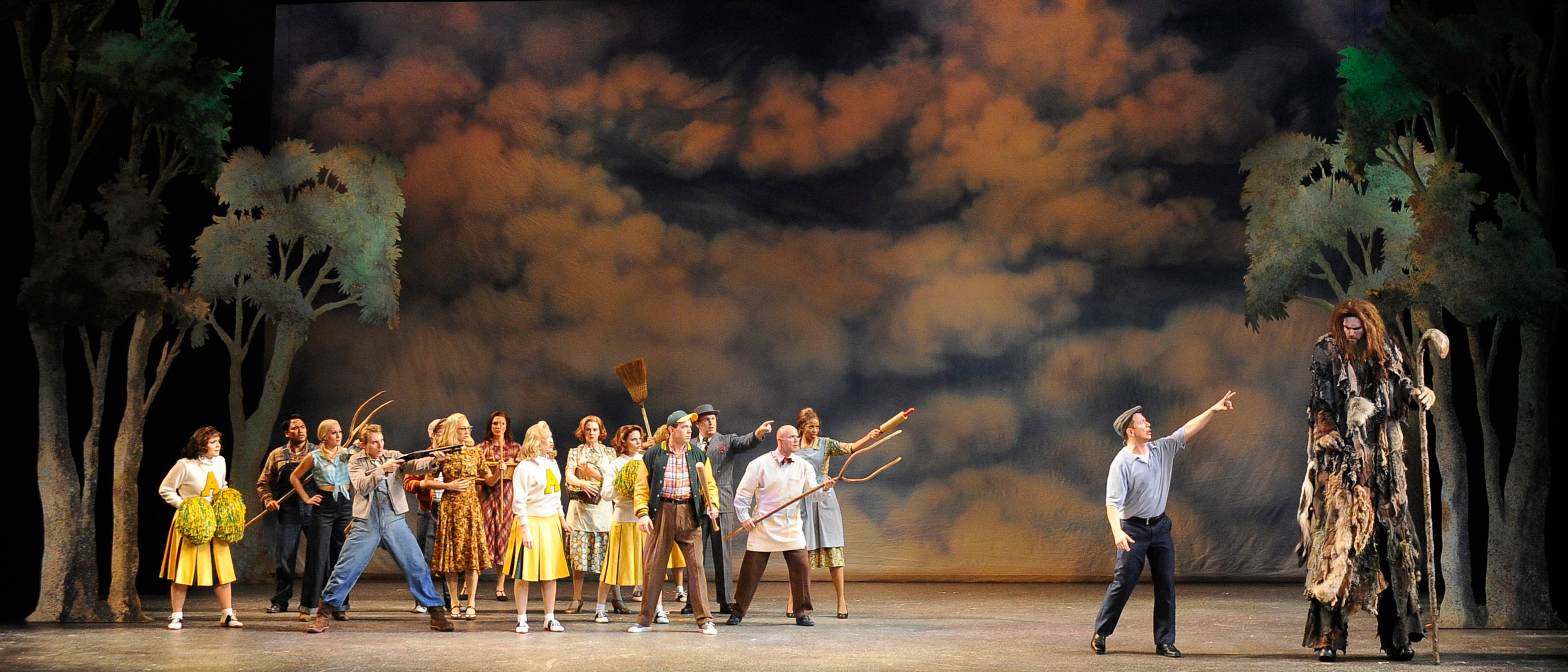
Photos courtesy of Musical Theatre West.
The human race is one of story tellers. Since the beginning of our recorded history, and likely since the start of our time on this planet, we have created mythologies, founded religions, developed superstitions, and practiced rituals. Over time, all of these have fed into the ever shifting and evolving narrative of our species. As our bodies are birthed, grow and eventually decay, the power of these narratives and of narrative in general, is intrinsically tied to the human experience. Our stories give our lives meaning, as our lives give meaning and seemingly, validation, to the stories we tell.
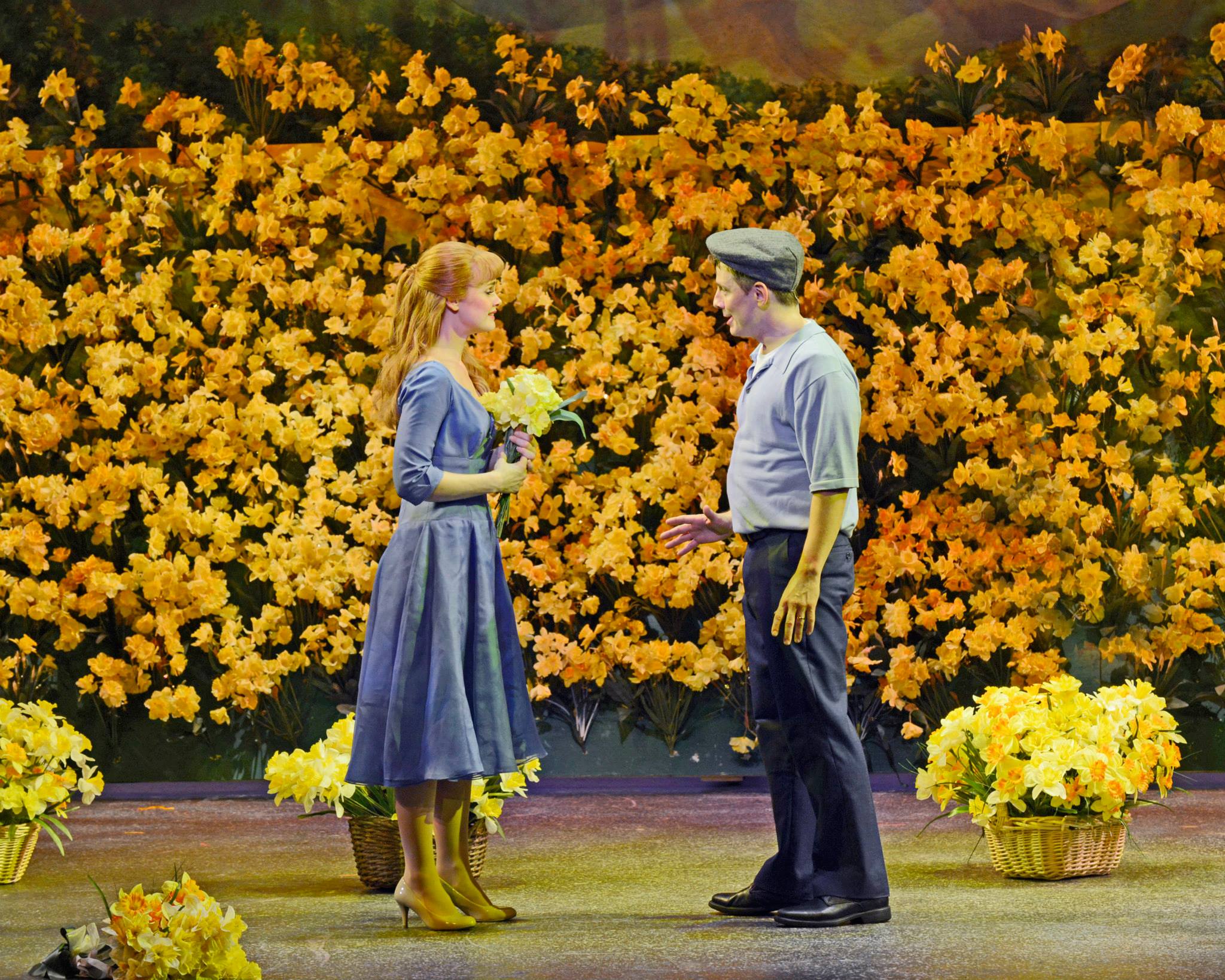 Stories are told in an attempt to illuminate, commiserate and ultimately, try to establish a series of guideposts through the lives we all live, parallel and in conjunction to one another. Edward Bloom, the protagonist of Big Fish: A New Musical is a story teller in the broadest sense of the word. A retired traveling salesman from the South, Edward is the type of person who creates his own mythology every time he speaks. His fantastical life stories, full of witches, giants, circuses and mermaids, are anecdotal and charming, but as Edward’s realist son Will has grown older, they have created a gap between the two men and their understanding of each other.
Stories are told in an attempt to illuminate, commiserate and ultimately, try to establish a series of guideposts through the lives we all live, parallel and in conjunction to one another. Edward Bloom, the protagonist of Big Fish: A New Musical is a story teller in the broadest sense of the word. A retired traveling salesman from the South, Edward is the type of person who creates his own mythology every time he speaks. His fantastical life stories, full of witches, giants, circuses and mermaids, are anecdotal and charming, but as Edward’s realist son Will has grown older, they have created a gap between the two men and their understanding of each other.
Edward’s style of storytelling is unceasing, which to many people around him, the theater audience included, is what is most appealing about him. To Will, however, the charm of his father’s tall tales has all but evaporated as he has grown older and realized that reality is not the way his father had made it out to be. When Edward learns his time on earth is limited, his son returns home to try to reconcile with his father and distinguish the myth his father created from the man he “truly” is.
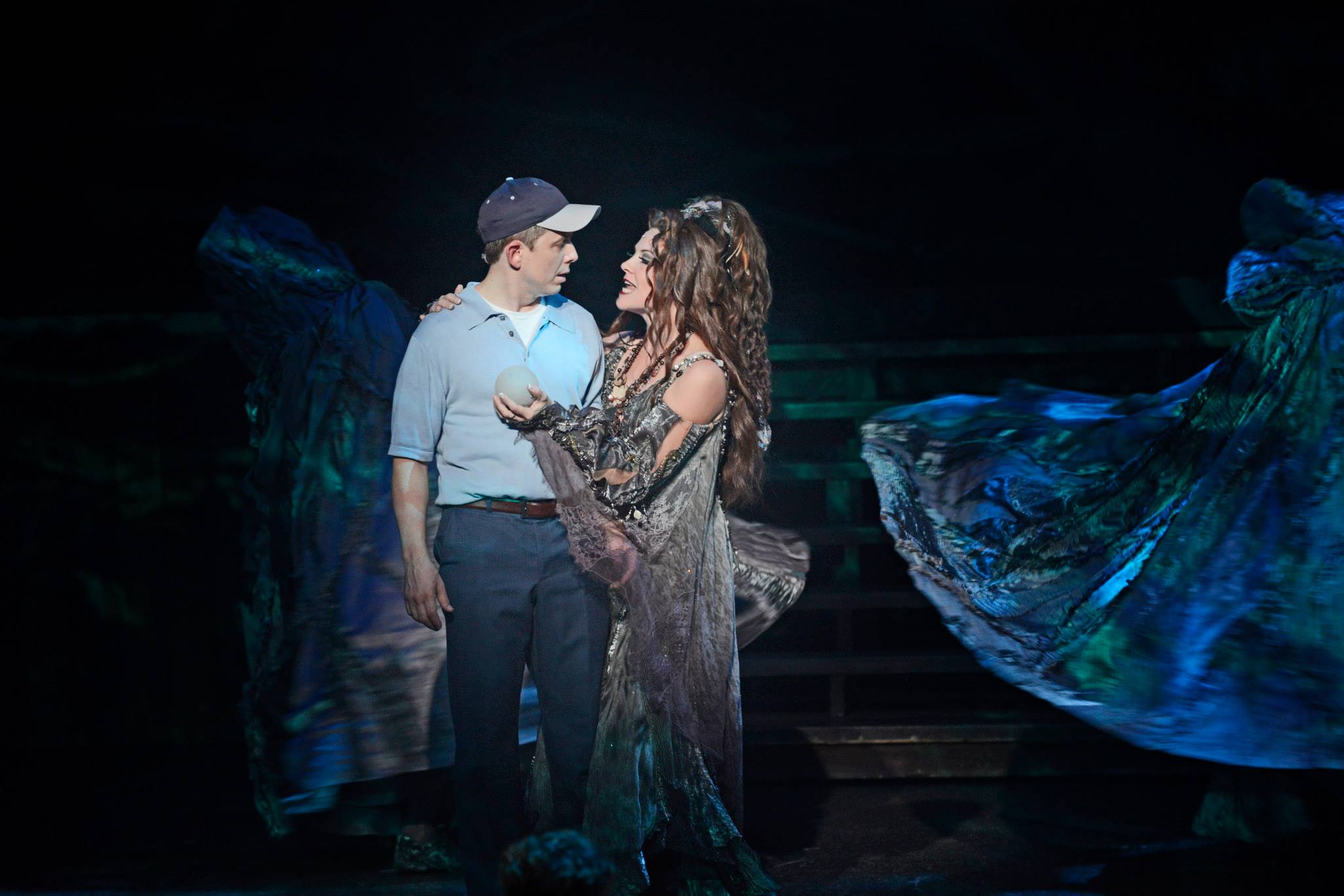
Big Fish: A New Musical is not the first time Edward’s stories have been told. Based on a novel by Daniel Wallace, and a motion picture written by John August (who also wrote the book here) which was directed by Tim Burton, this is the third incarnation of this story and sadly, it seems, the weakest. Making its West Coast premier at Musical Theater West after a short-lived run on Broadway last year, it is with a heavy heart that I report that this adaptation of the source material is far smaller than the sum of its larger-than-life parts.
I have not read the book that the Tim Burton film was based on, and though the film version of this story is still a bit uneven, it at the very least established a clear sense of narrative. Told from Will’s first-person perspective, the story’s focus clearly became that of Will coming to terms with his father’s nature and ultimately, his father’s death. Since Edward begins the film already very sick, there is a greater sense of urgency at the onset of the story and likewise, a greater sense of drama between the younger and older incarnations of his character than there are here in the musical adaptation. There is also a much needed sense of mystery and discovery in the Burton film. He allows for Edward’s stories to evolve slowly, as if from the mist, asking us to lean in and listen like children around a campfire. For the only time in the director’s career, he managed to make a film firmly grounded in a reality that was not entirely as dependent on aesthetic as it was on its plot. In Bloom, Burton found a kindred spirit of sorts, the kind of underdog story teller he perhaps dreamed of being himself.
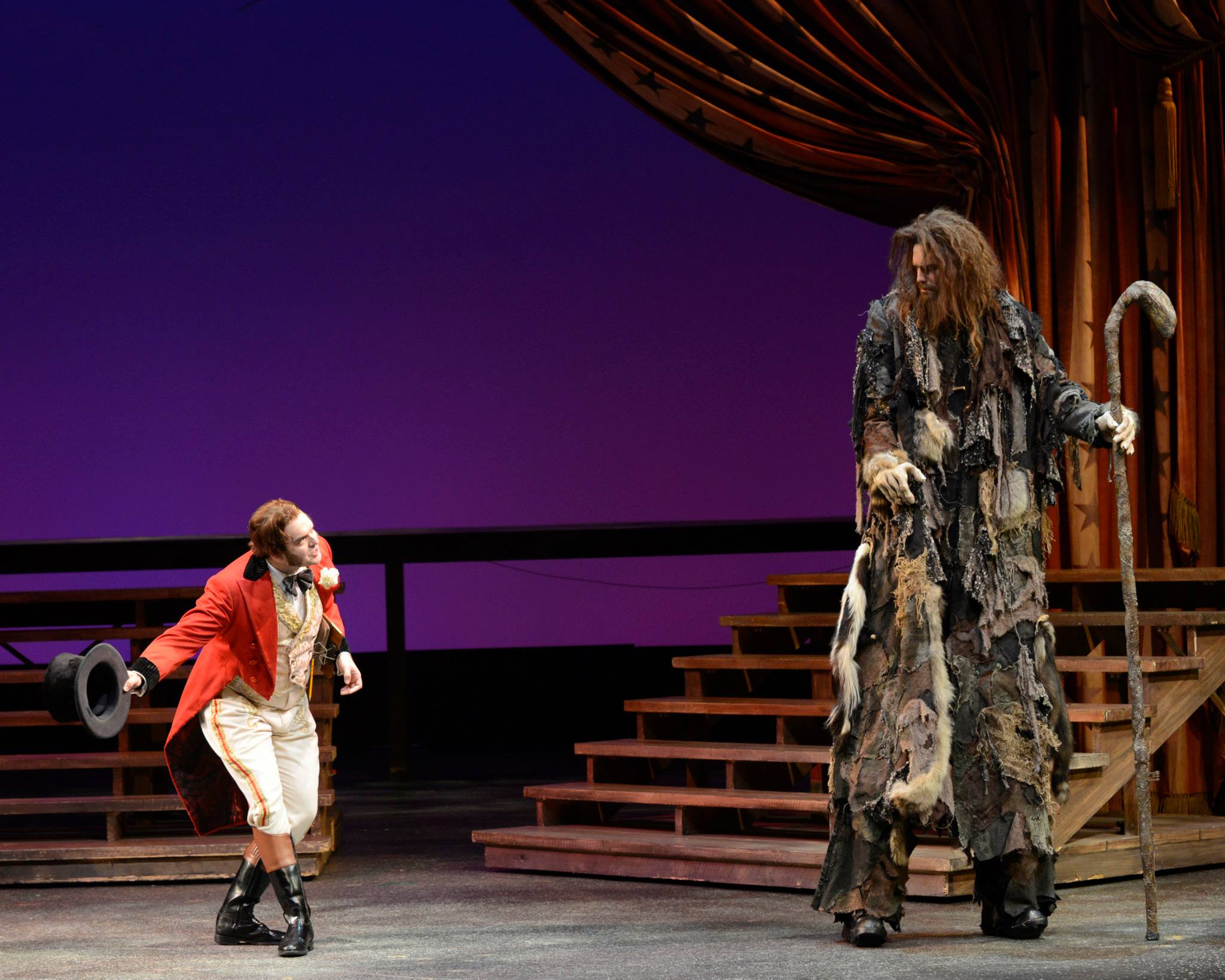 The musical adaptation of Big Fish is all flash and cliché, all tap dance and country western number. It replaces the story’s sense of mystery and intimate discovery with the sort of broad stroked-sentimental-gesturing we sadly see in so many musicals nowadays. The music and lyrics by Andrew Lippa are melodic and catchy, but their tone is so blatant and bombastic, so showy and full of artifice that they give the musical the aura of a parade-adaptation of a story, with each song a float, and each character a central figure waving from the middle of it all.
The musical adaptation of Big Fish is all flash and cliché, all tap dance and country western number. It replaces the story’s sense of mystery and intimate discovery with the sort of broad stroked-sentimental-gesturing we sadly see in so many musicals nowadays. The music and lyrics by Andrew Lippa are melodic and catchy, but their tone is so blatant and bombastic, so showy and full of artifice that they give the musical the aura of a parade-adaptation of a story, with each song a float, and each character a central figure waving from the middle of it all.
The stories Edward tells of his past come and go at random, and instead of developing into a narrative arc that leads us through Edward’s life, it feels as though we see things presented in the style of a review that doesn’t know it’s a review. If for example, the musical was conceived as some sort of dying hallucination and reflection of Edward Bloom, the musical structure may have become something imperative to the telling of his story.
As it stands however, it plays off as an attempt to make a quick buck on material that has already proven successful. The inconsistency of tone and style make the musical’s intentions and transitions feel muddled, and the songs’ lyrics seem hell-bent on finding the most obvious theme of each lesson’s core and burning a technicolored, kick-lined effigy to that theme.

All the characters here strive to be archetypical and recognizably human at the same time but ultimately end up painfully two-dimensional. Though Edward gets the closest to resembling a real person, his nature keeps him a perpetual mystery. With the baffling decision to do away with the reoccurring “big fish” metaphor that gives Edward’s life a ambiguous and transcendent meaning in the film, the play also abandons the purpose for keeping its title, making it a mystery as to why they didn’t just scrap the name entirely and call it something along the lines of “Edward Bloom: A Tall-Tale Life In Song And Dance.”
Musical Theater West has gone through great effort to bring Long Beach a quality presentation of Big Fish, acquiring the original Broadway Production’s sets and costumes and buying the rights to the musical’s West Coast premier. They have made some beautiful gestures leading up to this production as well, having The Giant deliver copies of the novel to all the local libraries and screening the film for free as a way to raise awareness of the production before the musical opened. I wish that I could say that all these efforts lead up to a production worthy of all the fanfare, but although everything about MTW’s version is as professional and polished in terms of production values as we have come to expect from the company, it does nothing to create a unique version of this play for Long Beach (as The Long Beach Playhouse’s new production of Spring Awakening does) and instead presents for us a carbon copy of the Broadway Original.
 The cast is uniformly talented, and all of the singing and dancing here is excellent. There is however, due both to the writing of the musical and the way in which it is directed, a real lack of personality here. Jeff Skowron as both the young and old versions of Edward Bloom is an incredibly gifted actor and singer, transitioning effortlessly between the young and older versions of himself, but it is in the few moments that he gets to simply speak that he is at his most believable and empathetically human. In a show so deathly afraid of quiet and calm, Mr. Skowron at least has the heart and talent to head this gifted cast.
The cast is uniformly talented, and all of the singing and dancing here is excellent. There is however, due both to the writing of the musical and the way in which it is directed, a real lack of personality here. Jeff Skowron as both the young and old versions of Edward Bloom is an incredibly gifted actor and singer, transitioning effortlessly between the young and older versions of himself, but it is in the few moments that he gets to simply speak that he is at his most believable and empathetically human. In a show so deathly afraid of quiet and calm, Mr. Skowron at least has the heart and talent to head this gifted cast.
Andrew Huber plays his son Will and though his singing voice is clear and powerful, he feels at odds with the emotional complexity beneath Will’s practical exterior and with no help from the writing he falls victim to his character’s facade.
Rebecca Jonson plays Edward’s wife Sandra, and as in the film, her character has next to no personality. All we know of Sandra is that she loves Edward, and although we are given an intimate moment with her in the form of her second act ballad “I Don’t Need A Roof,” we are still left with little more than that information about her. Jonson delivers that song beautifully and provides the most intimate musical moment of the show with great aplomb. Any real insight into Sandra’s character is still left at bay in this adaptation, suggesting that her relationship with Edward is all romantic gesture and fairy tale, another missed opportunity to dig deeper into these character’s lives.
The musical direction of Mattew Smedal is uniformly excellent and he conducts his orchestra beautifully. Though I think the score here is hokey and unoriginal, it is always a treat to hear a full orchestra led with precision and grace and Smedal makes that challenge feel effortless.
Larry Carpenter’s direction and Peggy Hickey’s choreography go hand in hand here, yet as I’ve stated before, neither help to elevate this mediocre musical from its inherent short comings. Yes we have our pretty pictures. Yes the dancers dance in unison. Yes, we’ve seen this all before.

Storytelling is an art and storytelling in the theater is arguably an even greater art. Not only must you be aware of the proper tone, pace, relevance and style of the story you are trying to tell, you also have to communicate those ideas while involving a great number of artists who all work in different mediums. The greatest failure of Big Fish: The Musical isn’t ultimately its inability to find subtlety and cohesive narration within its story’s structure, it’s in its relentless insistence to make all of its magic so literal and tangible. With every imaginative element spelled out for us by dancing trees and soft-shoeing elephants, the greatest key to all storytelling is evaded; that of allowing the listeners to use their own imagination to fill in the blanks.
The theater is a great temple of suggestion and imagination. When everything is spelled out for us within its walls, there is no need for us to carry its sermon home, as everything that it suggested has already been given to us. Imagine going to church and there being a guest appearance by Jesus himself telling you that all of your sins are resolved no matter what you do, solving at that moment all every question it once presented. After that, would you ever feel like you needed to come back and learn more later? I wonder.
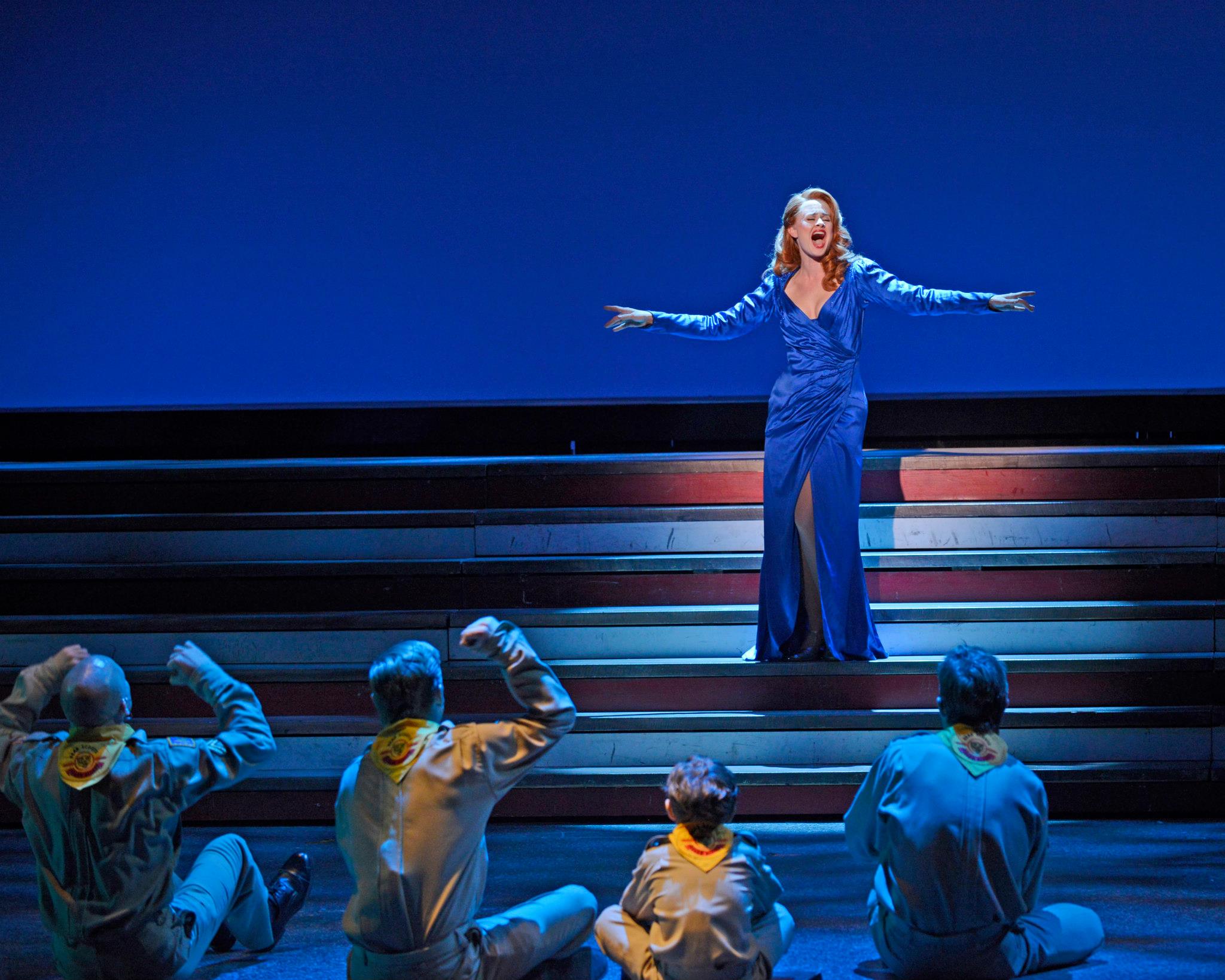 If your criteria for a night at the theater is simply that you must see a musical, any musical, then Big Fish has riches to offer you in spades. It physically does everything one expects a musical to do, and presents those tropes to you in a professional and polished manner and many people were on their feet at the end of Big Fish with tears in their eyes.
If your criteria for a night at the theater is simply that you must see a musical, any musical, then Big Fish has riches to offer you in spades. It physically does everything one expects a musical to do, and presents those tropes to you in a professional and polished manner and many people were on their feet at the end of Big Fish with tears in their eyes.
For better or for worse, in this day and age the kind of unabashed, bright style of old fashioned musicals needs more and more justification to feel relevant. This is not to say that big, bright, song-and-dance musicals are dead—see Hairspray or Book of Mormon for example—it is just that they require either a modern sense of humor or at the very least, a depth of character and consistent tone to work.
Musical Theater West, thank you for what you do for the community and thank you for taking a risk on bringing a new musical to our hometown. I do still wish that in the future we see productions from you that put as much faith in your characters and their discoveries as you do in your production values. For those of you interested in what Big Fish has to offer, it is wisest to perhaps turn your attention to its stories’ predecessors.
For more information and tickets, click here.

